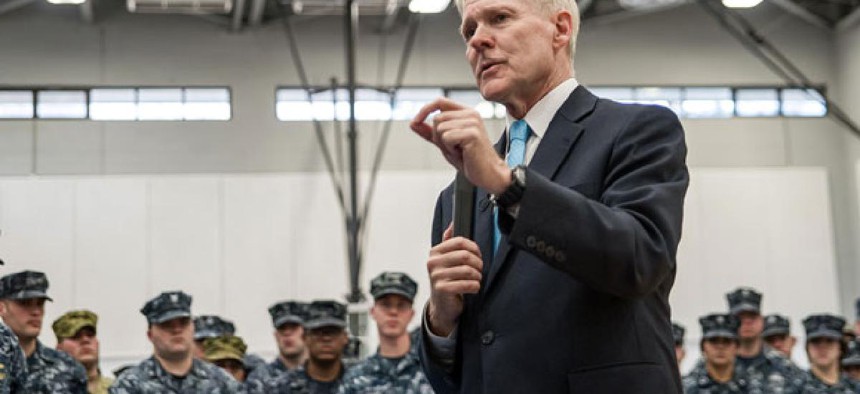
Navy Secretary Ray Mabus announced plans to pare back the service’s operations, investments and deployments Saturday. Defense Department
Pentagon Releases Further Sequestration Guidance
Support for congressional travel, Blue Angels shows and tuition assistance to face the budget axe.
Across-the-board spending reductions from sequestration will necessitate cutbacks to many Pentagon programs, including support for tuition assistance, congressional travel, bonuses for civilian employees and military entertainment, Defense Comptroller Robert Hale said Tuesday.
In a memo obtained by Government Executive, Hale told senior Pentagon leaders that that the changes would be necessary to help the Defense Department cope with the cuts “levied by sequestration.”
One area facing major cutbacks is support for travel by congressional delegations. Hale said the use of military aircraft would be restricted if commercial options were available. He also said that organizations would “need to ensure” that travel by members of Congress and staff sponsored by the Defense Department “bears a substantial relationship to programs or activities of DoD and is not solely for the purpose of engendering goodwill or obtaining possible future benefits.”
Other areas facing immediate cutbacks include tuition assistance programs and bonuses for civilians. The news about bonuses is not surprising; Office of Management and Budget Controller Danny Werfel said in a memo last week that this was one area that would be targeted if sequestration were to occur.
Major areas of the military’s entertainment and public affairs apparatus also are being curtailed. Demonstration flying in air shows -- such as the Navy’s Blue Angels -- is to be immediately shut down on April 1. Military bands will be forbidden from travelling outside of the area of their duty stations, except in situations where all transportation, lodging and other costs were paid by a sponsoring organization, the memo said.
Hale’s memo follows guidance issued by Navy Secretary Ray Mabus on Saturday, when he announced plans to pare back the service’s operations, investments and deployments in the wake of across-the-board cuts from sequestration.
Mabus told the service that officials would “commence some reductions,” including shutting down a carrier air wing in April, deferring humanitarian deployments abroad, canceling the deployment of six ships and bringing several ships back to homeport.
He also said that they would begin negotiations to reduce investments in some areas, including in the Virginia Class submarines, reactor power units and the Joint High Speed Vessel. Mabus added that the service would slow the Marine Corp’s depot maintenance, including a reduction in the temporary workforce.
“These actions are being taken to preserve support for those forces stationed overseas and currently forward deployed,” Mabus wrote. “We made these choices carefully, while trying to preserve our ability to reverse or quickly restore negative effects if and when funding is restored.”
The Navy also noted on Monday that civilian furloughs could cause financial hardship for many workers, which may inadvertently impact their security clearances. Officials told workers to take advantage of Employee Assistance Programs, and noted that many of the security officers in charge of maintaining clearances also would be affected by the furloughs.







